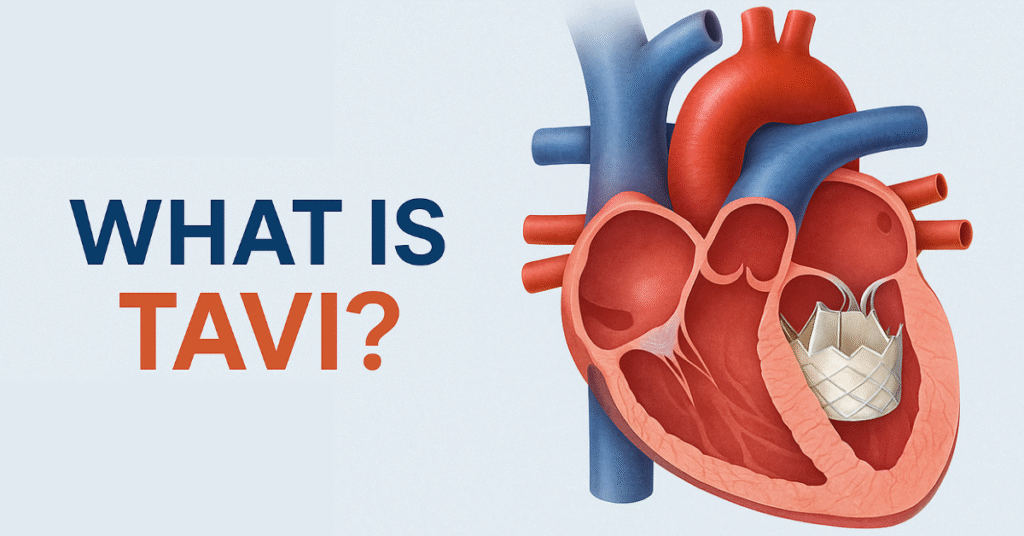What is TAVI? A Breakthrough in Heart Valve Treatment
When it comes to heart health, early diagnosis and advanced treatment options can make all the difference. One such revolutionary advancement in cardiac care is TAVI (Transcatheter Aortic Valve Implantation), a minimally invasive procedure that offers new hope to patients with severe aortic stenosis who are not ideal candidates for traditional open-heart surgery.
As a TAVI expert in Pune, Dr. Tanmay Kulkarni, widely regarded as one of the Best Cardiologist in Pune, brings cutting-edge care to patients suffering from complex heart valve conditions. Let’s explore what TAVI is, who needs it, how it works, and why it’s transforming cardiac treatment.
Understanding Aortic Stenosis
To understand TAVI, we must first understand aortic stenosis—a condition where the aortic valve in the heart becomes narrowed. This narrowing restricts blood flow from the heart to the rest of the body, causing symptoms such as chest pain, fatigue, shortness of breath, and even fainting. If left untreated, severe aortic stenosis can lead to heart failure and significantly shorten life expectancy.
Traditionally, the only long-term treatment option for aortic stenosis was open-heart valve replacement surgery. However, for many elderly patients or those with other medical conditions, surgery is too risky. That’s where TAVI steps in.
What is TAVI?
TAVI, also known as TAVR (Transcatheter Aortic Valve Replacement), is a minimally invasive procedure used to replace a diseased aortic valve without removing the old one or opening the chest. Instead, a new valve is implanted within the existing damaged valve using a catheter inserted through a blood vessel—typically from the leg.
TAVI is a game-changer for high-risk patients who are not suitable for open-heart surgery. With a shorter hospital stay, faster recovery, and reduced complications, TAVI offers a new lease on life.
How Does the TAVI Procedure Work?
The TAVI procedure is usually performed under local anesthesia or conscious sedation and involves the following steps:
- Accessing the Valve: A small incision is made, usually in the groin, to access the femoral artery.
- Inserting the Catheter: A catheter carrying the replacement valve is guided through the artery into the heart.
- Deploying the Valve: Once in position, the new valve—often made from cow or pig tissue—is expanded inside the damaged valve, pushing the old valve leaflets aside.
- Restoring Blood Flow: The new valve takes over, allowing blood to flow freely from the heart to the rest of the body.
The entire procedure typically takes 1–2 hours, and most patients are up and walking within a day.
Who is a Candidate for TAVI?
TAVI was initially developed for elderly patients who were at high or intermediate surgical risk. Today, thanks to years of success and ongoing research, the eligibility criteria have expanded.
You may be a good candidate for TAVI if:
- You have severe aortic stenosis
- You are not suitable for open-heart surgery
- You have other medical conditions that increase surgical risk
- You prefer a minimally invasive treatment option
A TAVI Expert in Maharashtra, conducts a comprehensive evaluation including imaging tests, heart function assessments, and risk profiling to determine the best treatment approach for each patient.
Benefits of TAVI
Patients undergoing TAVI experience several advantages:
- Minimally Invasive: No need to open the chest or stop the heart
- Faster Recovery: Most patients are discharged within a few days
- Improved Symptoms: Dramatic relief from breathlessness and fatigue
- Better Quality of Life: Return to normal activities sooner
- Lower Risk: Reduced chance of stroke, bleeding, and infections compared to surgery
These benefits make TAVI the gold-standard treatment for many patients with aortic stenosis.
Risks and Considerations
Like any medical procedure, TAVI does come with some risks. These include bleeding, infection, valve leakage, stroke, or vascular complications. However, with advanced techniques and experienced specialists like Dr. Tanmay Kulkarni, these risks are minimized.
It’s important to have a detailed discussion with your heart specialist about the benefits and risks of TAVI, especially if you have other heart or health conditions.
TAVI in Pune: Why Choose us?
If you’re searching for a TAVI Expert in Pune or TAVI Expert in Maharashtra, look no further than Dr. Tanmay Kulkarni. With extensive experience in performing transcatheter valve procedures and a compassionate approach to patient care, Dr. Kulkarni is recognized as one of the Best Heart Specialist in Pune.
His focus is not just on treating heart disease but on improving your overall heart health through personalized, evidence-based care.
Conclusion
TAVI is more than a procedure—it’s a life-saving innovation that gives patients with severe aortic stenosis a second chance at life without the burden of major surgery. With its minimally invasive approach and high success rate, TAVI represents the future of heart valve treatment.
If you or a loved one is suffering from aortic stenosis and want to explore advanced treatment options, consult a trusted TAVI Expert in Pune and one of the Best Cardiologist in Baner.
Book an Appointment Today
📞 Call 8551913753
🌐 Visit Our Website: www.drtanmaykulkarni.com
Take control of your heart health—because your heart deserves the best care.


 Select an element to maximize. Press ESC to cancel.
Select an element to maximize. Press ESC to cancel.